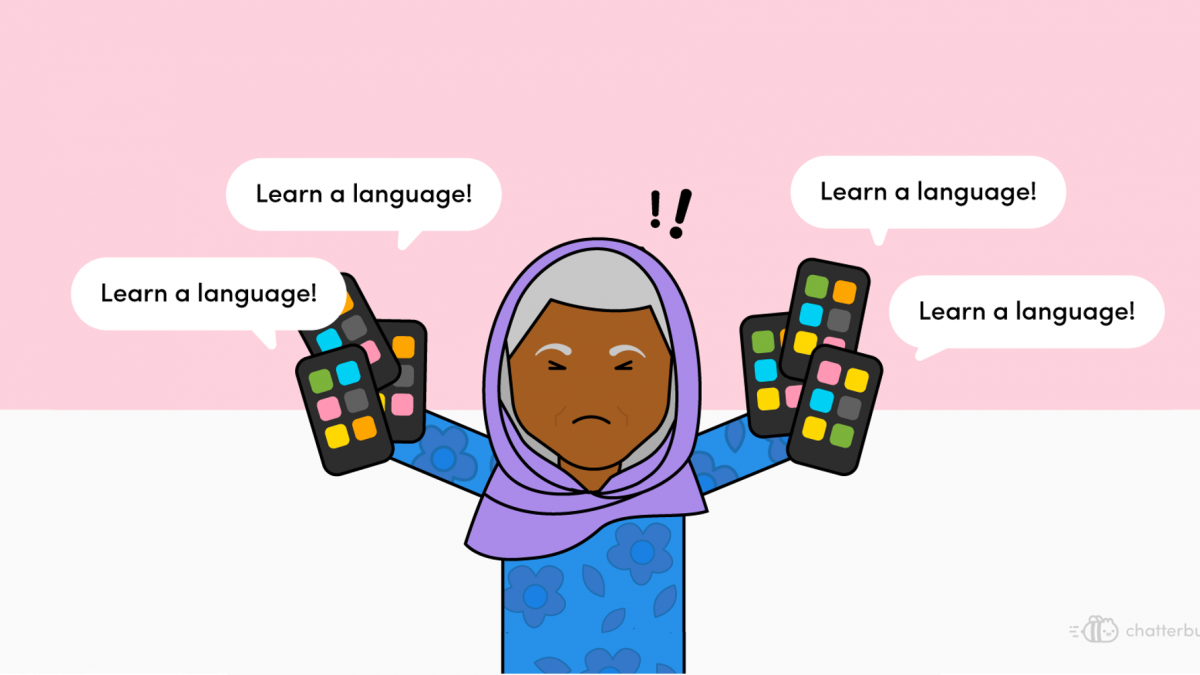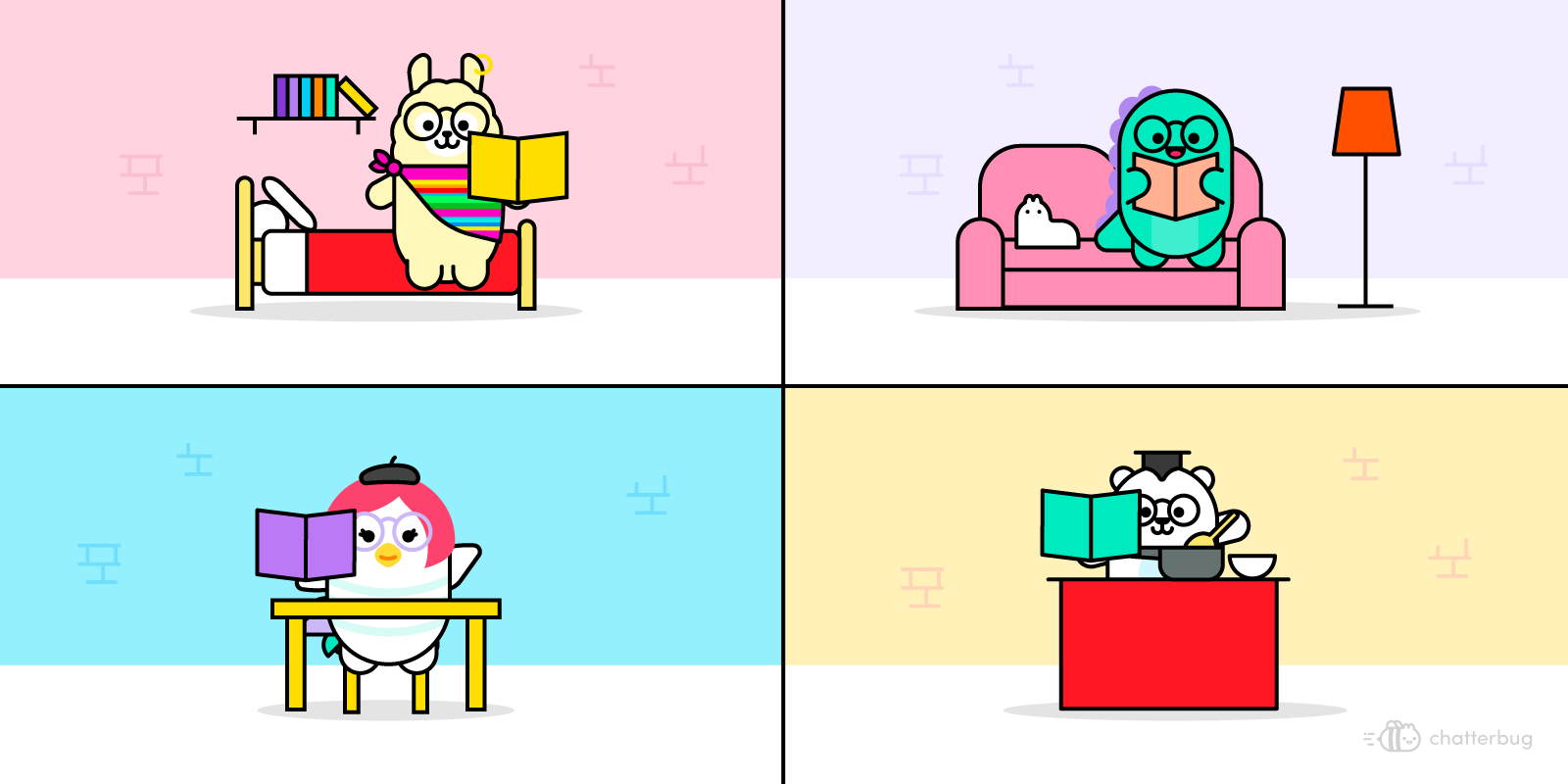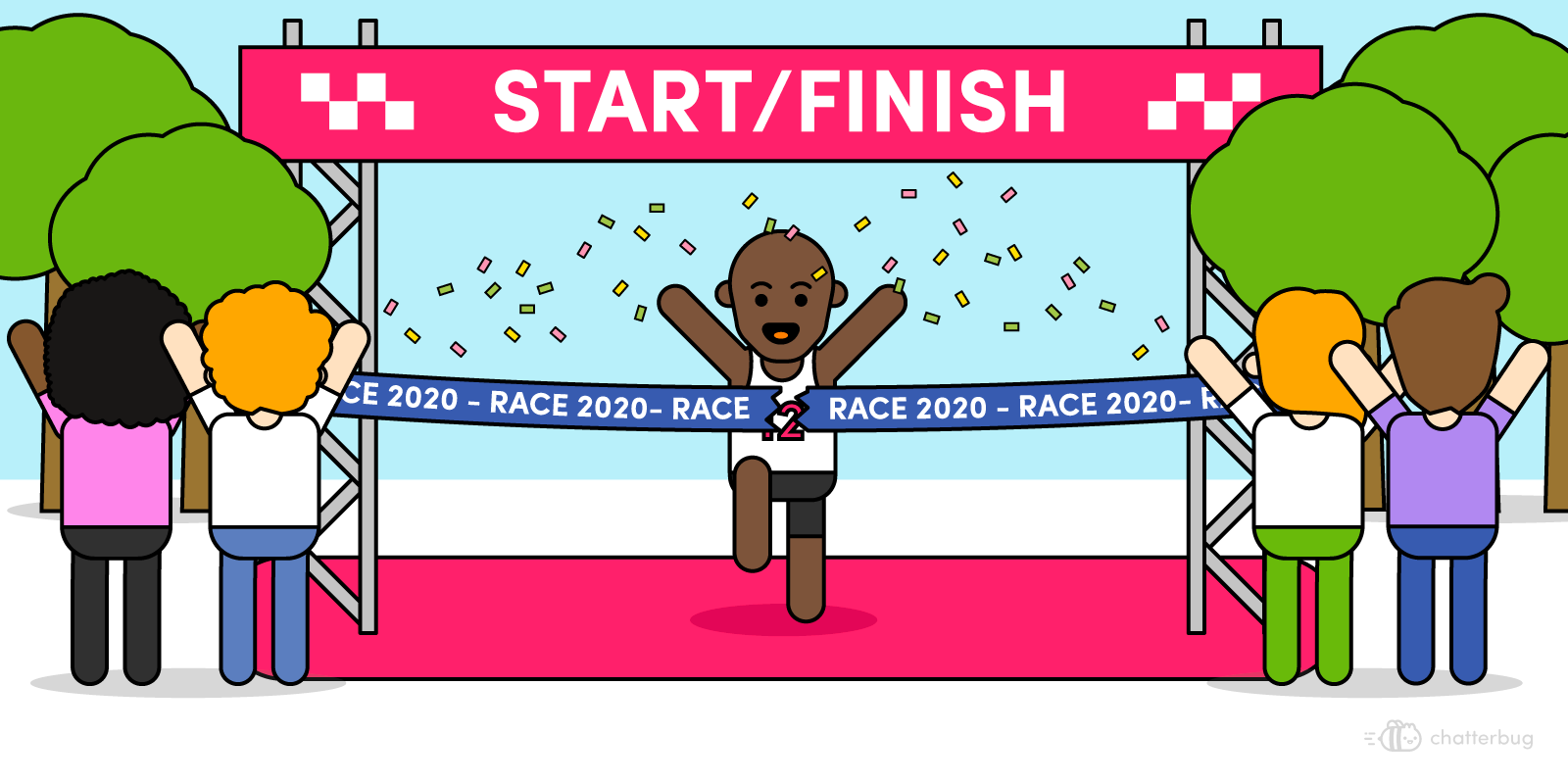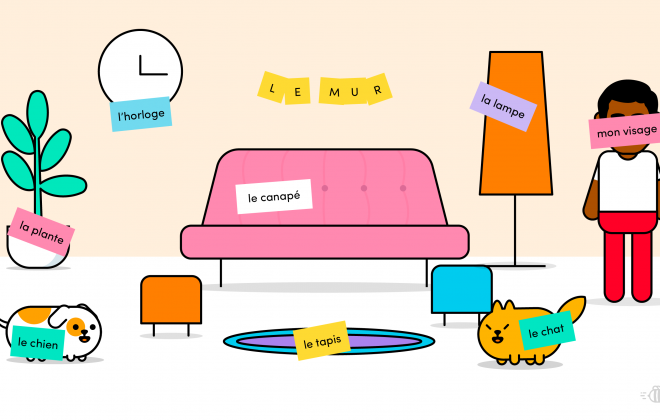ChatterConf: Too Many Apps to Choose From!
On the 23rd April, Chatterbug hosted Chatterconf, a virtual conference all about learning languages! Over the course of one day we virtually brought together language enthusiasts from all around the world to learn about the world of online language learning.
Below is a video of Lýdia Machová, founder of Language Mentoring, giving her presentation on how structure your language learning without becoming overwhelmed. We’ve included a transcript of the video underneath.
Video – Too Many Apps to Choose From!
Transcript
Edited for readability
Hello, guys. Good to see you. I know some of you actually in person. I know some of the speakers at this conference in person, so I feel like we’re almost meeting here like friends.
I want to talk to you about how to pick the best learning tools, but actually the real answer to this question will be different than what you would probably expect. But we’ll get to that. Before we start, let me briefly introduce myself. As Megan said, I’m a polyglot, that means I’m a big language fan. I like learning languages one after another. I’m originally from Slovakia, which is my home country, and I started to learn the first language when I was 11. Then, basically, almost every two years, I learned a new language and I’m trying to keep seven of them on a fluent level. This is my style of learning languages.
I usually take a language, concentrate on it full time and after two years I take on a new language. I’ve been doing this for 20 years and if you start at the age of 11 that brings you to a few languages. I’ve also been a language teacher for 10 years. I taught various types of students, starting from primary school, then moving to secondary school, even university students, adults in language schools, in companies, so I have a lot of language teaching experience. But then I changed it after a few years and I became a language mentor. This is what I do now full-time.
I have a company called Language Mentoring and I don’t teach people languages, but I help them to learn languages by themselves. That means that I even help people learn languages which I don’t speak in person. I will tell you some of the methods and some of the methodology that I use in this presentation. I’m not doing this by myself. I have an amazing team of my colleagues who are helping me help other people learn languages. We do online courses, I do some presentations, and together we are helping thousands of people learn languages every day. Besides that, some of you may know me as the former organizer of Polyglot Gathering, which I organized in 2017 and 2018 here in Slovakia in Bratislava. If you look at the picture, you’ll recognize one of the speakers of this conference standing right next to me.
Steve was also at some of our Polyglot Gathering events and he had an amazing speech at the event and we’re looking forward to his talk today as well. Some of you may also know me from some of the conferences that I’ve spoken at or maybe seen my TED Talk, which I really still cannot quite believe, but it’s getting a lot of attention online. It has been viewed by more than 7 million people by now. In those 10 minutes, I basically give my best knowhow, the secrets on how to learn a language. I will tell those secrets in this talk to you, but if you want to watch something afterwards, then you might want to watch this TED Talk too. Good news for all of you guys, if you watch this till the end, you will learn where you will get a special present from me.
I was thinking how to help people in the best way in the 13 minutes that I have and I realized that I cannot tell you everything and all the secrets, so I have something special prepared for you and I will tell you at the end of my talk. I will tell you where you will get that special present.
The Four Pillars (04:27)
So let’s start. I cannot have any talk about language learning without mentioning the four pillars of my language learning philosophy.I honestly believe this is what it takes to learn a language.
When I thought about what helped me learn all those languages and what helped all the polyglots that I know, learn all those languages, it basically comes down to a few principles which we have in common, and these are the following.
The first pillar (04:54)
First of all, when you’re learning a language, you need to make sure you have fun in one way or another. It doesn’t need to be the most fun experience in your life, but it needs to be enjoyable. At least a little bit.
I see a lot of people struggling with language learning because they are using materials which they can’t stand or they think that they should definitely learn with this book and go through this even though they cannot stand looking at the book. I think there are so many ways, so many methods how we can learn languages out there that it really is quite simple to choose something that you like at least a little bit. It should be materials which you like, enjoy reading about or listening to and it should be methods, apps, whatever you use to learn a language, you should make sure that you like it at least to a part.
The second pillar (05:45)
The second pillar is having a lot of contact when learning a language. It has been mentioned by some of the speakers today. It does take some time to learn a language, and it’s not possible overnight or within two weeks. It surprises me how some people think that if they spend five minutes a day with an app, in two weeks they are disappointed that they don’t speak the language yet. It just doesn’t work like this. Anyone who has ever learned a language seriously or to a good level will tell you that it is not possible to learn a language within a few weeks.
It requires more time. So you need a lot of contact. It has been mentioned as well by other speakers, that the only way to learn how to speak is to speak a lot. You really need to make sure you have contact with the language in the way which will help you use it in practice.
The third pillar (06:40)
The third pillar is using effective methods. This basically means that, well, speaking or tying it up to the thing which I’ve just mentioned, if you want to speak a language well, you need to make sure you practice speaking a lot. And you need to make sure that your methods are effective.
If you want to learn to understand people, because they speak in a language and you don’t understand when native speakers are speaking, you need to make sure you practice listening a lot. Again, there are a lot of methods how you can go about them, and we will go into more details in this talk about the methods.
The fourth pillar (07:15)
Finally, I believe it is very important to find a system in one’s learning. This is, again, something that many people struggle with. They are excited at the beginning. They want to learn a language, but then they don’t make any plan. They don’t make it systematic at all, and after a few weeks they usually give up. They feel like a failure and they usually think, “Oh, it’s because I don’t have a language talent,” but actually what many of them were missing is a system. Now, this conference is about online language resources, about modern resources that we have available everywhere on the internet, and there are a lot of them.
I believe the biggest problems that people struggle with, and hopefully, that also relates to you guys watching this conference, is that people don’t know how to really use the methods that they have available or what methods to pick and how to apply them in practice and system.
In my talk, I would like to mention these two pillars. We will go into more details, and I want to provide practical tips for you on how you can make sure that your language learning is effective. Let’s use a method which is really, really efficient for you and also how to make your language learning systematic.
Language learning is a long term process. (08:25)
It’s something that takes some time, and in order to get to the end of it, to get to some visible results, we need to make sure we motivate ourselves somehow to deal with language learning every day, to find the time for it. I believe being systematic is the key to that. Let us now start with the third pillar, with methods first. Afterwards, we’ll have a look at the system in language learning.
The question is how to make sure your language learning is effective. Many people ask me the question:
“Which app should I choose? Which method? Which resource? Is this app better than the other one?”
Well, my answer may surprise you, but it doesn’t really matter which app you choose because I believe the most important thing is how you use that app, how you use the resource which you decided to use. The good news is that almost any resource out there is a very good resource for you if you use it effectively, and if you make the most of this resource.
Now, what does it mean? (09:30)
To make the most of the app, I believe it’s not enough to just do what, for example, an app with some, let’s say language practice, with some examples, with some maybe grammar sentences or … Usually, apps are about practicing vocabulary. If they only want you to do some exercises, matching some words or translating or completing some sentences with some words, if that’s the only thing they want you to do and you only do that, you’re not taking or using the full potential of this language learning resource. What I believe is very important, to do some after-work with the app.
Now, what do I mean by that? I want to tell you about three concrete methods which I believe personally that are the best to learn vocabulary. I believe that everyone should include one of them in one way or another into their language learning. Because, it is not enough if we just keep encountering some words. For example, when we read a text or we listen to something, sometimes we hear a word which is new to us, but if you don’t do anything with that word, it will not get stuck in your brain and it’s very difficult to keep it long-term. So you will keep encountering new words in new texts and materials, but they will not stay in your longterm memory. This is, I believe, the goal of language learning.
We want to be able to use it in practice. Not just know that, “I’ve seen these words somewhere.” We want to really be able to use it.
Now, what are the three methods?
Flashcards (11:11)
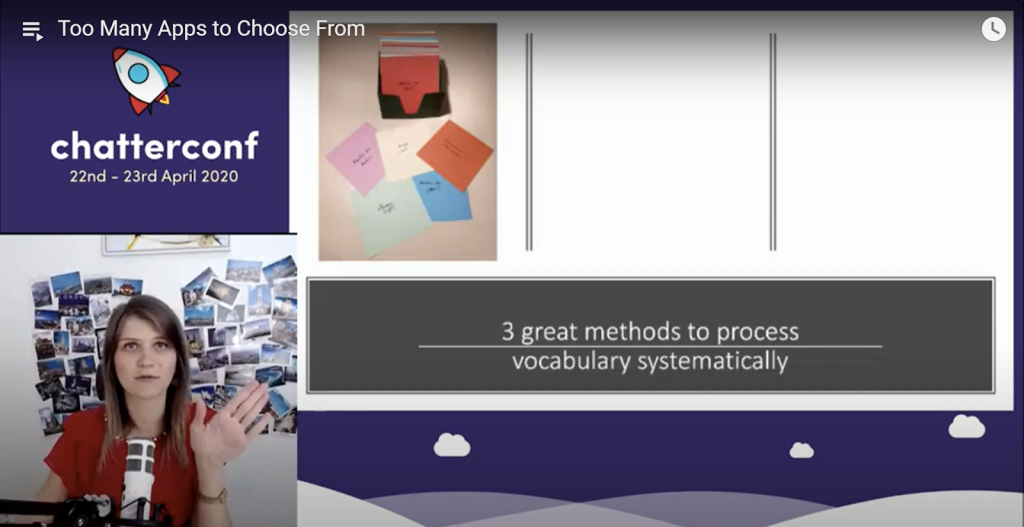
The first of them, I’m sure most of you have heard about it or probably used it, is paper Flashcards. Have you ever tried using that or have you ever heard about this?
It’s pretty simple. You create little cards of expressions or words or phrases. One side of the card is in your language, the other is in your target language, and then you make a stack of the cards, just like in the picture. Now, when you test yourself, you take the first card, the red one, and you test yourself. You look at the word or expression and you think, “Oh, what is this in French or Spanish?” Whatever you’re learning. You say it out loud, check it. If you were right, you put the card at the very back of this stack. Because it was an easy expression.
If it was more difficult, you put it closer to the beginning. Because then you will take another card and another card and another card, and you want to make sure that the difficult words get repeated more frequently. So if you don’t know it again, after five minutes you will put it again at the beginning and after five minutes the card will come again and it will test you.
This is a very simple explanation of the space repetition system, which I believe is a very effective way how to learn anything, not just languages. But it’s really very efficient for language learners. So what you can do is you can create your own flashcards cut out in paper. I like to use colorful pieces of paper, like the ones in the picture, which I use for Swahili. They can, obviously, be just simple pieces of paper.
Flashcard apps (12:36)
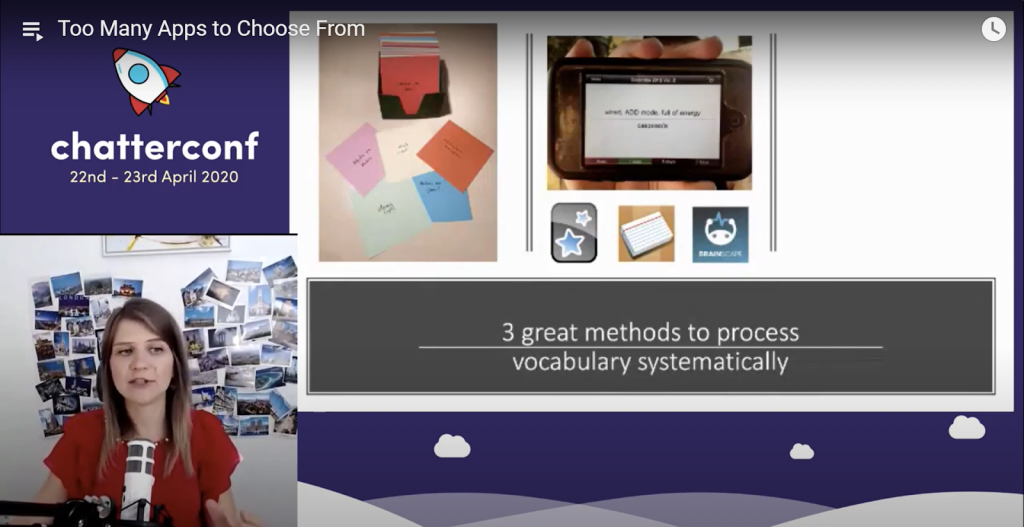
If you want to keep it digital, you can do the same with flashcard apps. These are just some examples of free flashcards apps, such as AnkiDroid for Android, Flashcards Deluxe or Brainscape for iPhone users. You can do the same just without any paper and writing in hand. So you create your own flashcards and you keep revising every day for at least five or 10 minutes. You will see how these words will get stuck in your longterm memory. It works really, really well.
The Goldlist method (13:06)
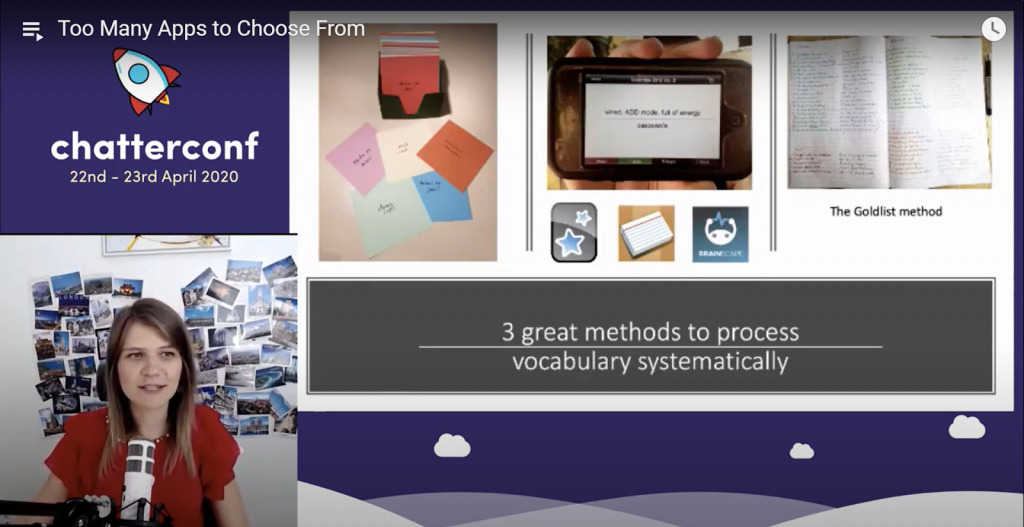
My absolutely favorite method, which I don’t know if you’ve heard about, but I really love using it and I also love talking about it because it’s helped so many people I know.
It’s called the Goldlist method.
The Goldlist method – how does it work?
This is a very interesting way to learn vocabulary; by writing it down into a notebook and distilling or making filtration of this vocabulary after two weeks. Rewriting it on another part of the notebook, basically on the other side of the paper. It’s really interesting because you don’t do anything with the words for two weeks, and after two weeks you find out that you somehow remember about 30% of those expressions.
I remember when I heard it for the first time, I was like, “That’s nonsense. This cannot work. That’s weird.” But then I tried it and I was absolutely amazed that it really does work in this way. You write a list, after two weeks, you remember 30% of them. You re-write the words which you didn’t know and after two weeks, again, you remember 30% of those words which you already distilled from the previous list. (We have a free ebook here.) It’s really simple. It works like magic. I hope you like using it too.
These three great methods to process vocabulary I believe are really crucial for anyone who wants to learn a language really well. What I’m suggesting here is that, whatever app you use, and it doesn’t matter if it’s a podcast or if it’s book, if it’s a magazine, whatever resource you use, make sure you actually process the vocabulary afterwards. That means, let’s say you have an app where you play around with some words. It gives you some new expressions and you match them or you, I don’t know, translate, you practice pronunciation, whatever the app is about, make sure you actually spend extra time after working with the app to write down maybe five or 10 new expressions which you will put into one of these three methods to process vocabulary. Pick just one of them, do all three of them at once. Okay? Just pick one of them.
It doesn’t matter which one, all of them are effective. It just depends on what you prefer, and make sure you put these expressions into this vocabulary processing method right away. Then every day spend 10 minutes reviewing the vocabulary which you learned previously. It will make your experience of learning with the app so much more deep, profound and effective that, I believe, you will feel really motivated to keep on learning using the app that you chose.
If you have a transcript for whatever materials you are using as audio, and that’s perfect because you can use them, again, in a much more profound way. An example of an app where you could use it is Coffee Break Languages that I personally also loved using for learning French. Mark from Coffee Break Languages had a talk before me, so I believe his app is perfect for this or also the LingQ app by Steve Kaufmann who is also going to speak later on today. These are just examples.
You can use it for any podcasts out there or anything which has a transcript. Now, what do I mean by processing the vocabulary? First of all, you just listen to whatever material you’re listening to. Let’s say it’s a podcast episode or it’s a short text within the podcast, which is in the target language. You just listen to it, you don’t read anything. In the second round, you listen and read at the same time. So you listen again, you’ve listened to it once, you listen again for the second time and now you read the transcript.
Afterwards, you read and look for interesting phrases. So now you put away the audio recordings and you just work with the text more intensively. This is the effective part of learning any language. This is where the effective method start to work. Afterwards, you process the phrases into your flashcards or Goldlist or anything else. You can just write them on a piece of paper, just make sure you review them in regular spaces.
This is, again, an example of how you can work with any material out there. Again, it doesn’t matter what you choose, work with it in a more profound and effective way. I also have a few vocabulary learning principles for you, which I want to share. Some of them might be new to you, some of them maybe you’ve heard already before.
What I would like you to do to try next time that you work with vocabulary is to collect your own vocabulary. Do not just follow any set of vocabulary in a book, even if you work with a podcast which you like and there are some words which you are not sure whether you would like to use or if you really need them, skip them. Feel free to be picky about your vocabulary. The way I learn languages, I always pick the words which I want to learn and then later on I will learn other words. It doesn’t matter, you don’t need to cover all the words which are in the language resource that you’re using. The second thing is, always work with words in context. By that I mean, don’t try to just write one word which you encountered somewhere, but try to write it in a little sentence that you found in the text or in the podcast, wherever.
For example, don’t just write, “To send,” but write, “I sent a letter.” The combination of send and a letter, it will be much, much easier for your brain to actually remember this. So working in context is much more important. Reviewing much more than you learn new stuff. This is something I’ve already mentioned. So many people make the mistake of always trying to learn new words. They’re excited about going through new stuff and new chapters in a book and just new, new, new words. But they’re not reviewing the older words, and that’s when they’re not sticking in your longterm memory.
So it’s much more important to review than to learn new stuff, much more efficient. Also, whenever I test myself or I learn any vocabulary, I make sure I test myself from my mother tongue into the target language. So I don’t only check my passive comprehension, whether I understand the word or the expression, but I always make sure I see it in Slavic first. Think about it, how to say it in French, check on the flashcard and like, “Okay, now I know this phrase. I can use it.” So I always test myself in this direction. Then I also learn out loud if possible. This is not always possible, but if you’re alone and if you can do it at least five minutes a day, 10 minutes a day, it’s very, very efficient.
My final tip for you about vocabulary and about working with methods is, also work with words that you understand passively. For example, you see the word like conference, a cognate word, which in many European languages is very similar. Like in Slovak it’s konferencie. So I would see conference and I would think, “Oh, I know this word. It’s easy.” But actually, the trick is to put it into your language learning resource or method. Nevertheless, it’s very important that you check whether you can also say it actively and not just understand it passively.
These are the best tricks for you if you are working with any vocabulary. Again, let me just stress, it’s much more important how you work with a given set of words, vocabulary, than which app you choose or which resource, which method you apply.
Now, let us get to the second part or to the fourth pillar, which is about learning systematically. I don’t know about you, guys, but this is how I feel learning all of my languages all the time. No exception. I always have some ups and downs in my motivation and sometimes I feel super excited like, “Yay, I want to learn Russian. I feel so excited.” Then after a few weeks, I feel, “Oh, this is too difficult. I’m never going to understand this language. The grammar is complicated. There’s just too many words. It’s all written in a different way than it’s pronounced. I feel frustrated.”
I want you to know that this is perfectly normal, to feel like this. Everybody feels like that. I don’t know a single polyglot and I know several dozens or hundreds of them, rather. I don’t know anyone who will never feel frustrated with a language. We just need to accept that this thing happens and it’s okay. But the question is, how do we make sure we use our ups to make sure that our downs are more doable or more pleasant and that we get over them so that we get back to the app period where we feel super motivated?
My tip for you is, whatever way you work with a language, whatever app method you use doesn’t matter. Just make sure you turn it into a habit and you commit to doing it regularly. This is where we get to the systematic part of learning a language.
Let me give you a few examples, how else systematic learning plan works. Let’s say you want to work on your vocabulary. You found a wonderful app, you love it, it’s fun, it’s nice. Make sure you decide in advance how often you’re going to use it and how much time you’ll spend with it.
For example, and these are all just examples, I’m going to use this app six times a week for 10 minutes and then for 20 minutes I’m going to process the vocabulary the way I’ve described in the first part of this talk.
Writing
So I’m going to write down the words and actually check their meaning in the dictionary. Make sure I write the whole phrase, make sure I test myself from my mother tongue into the target language, but I really need to commit myself that I will do this six times a week. This is very, very important, especially when you’re doing it in the app part of your motivation. Because then, the down part comes in, you will not want to do it. You will just not feel motivated.
Speaking
Speaking. If you decide to practice your speaking, let’s say twice a week for 60 minutes with a tutor, such as from a chatterbug or whatever tutor. You have a friend, you speak to yourself, it doesn’t matter. Make sure you schedule it and put it in your calendar. It’s very, very important. It will help you overcome those rough times.
Grammar
With grammar. Maybe you want to do four times a week, 20 minutes of grammar exercises. Listening. You decide to do it seven times a week, 30 minutes while you are walking or doing something else, using your downtime as mark pointed out. Or with reading. You do it five times a week, 20 minutes, and then you look for useful vocabulary. Again, these are just examples.
The particular setup depends on your time possibilities and how serious you are about your language learning. But I believe it’s really, really crucial that you create this plan in advance. Maybe you feel motivated to learn languages right now at this conference, then use it and make sure you write it down, make a plan and then track your learning. This is the third part that we’re going to get to.
Pick two three methods to learn with
So the three steps to learn systematically. It’s very simple and it really works amazingly. First of all, pick two or three methods. Don’t try to work with 15 different apps because your friends told you they are all amazing. Just stick to one, two or three methods. For me, ideally three. For example, one of them would be for vocabulary. One method would be for speaking.
Let’s say I have a tutor for my sessions or tandem partner. The third one would be maybe for listening. That time, I don’t worry about grammar, writing, pronunciation and everything else.
Because later on, after one or two months, I can change those methods. But right now I want to focus on just two or three of them. This is very important because it will keep your focus on something that can keep improving. Create a learning plan, use the time when your motivation is high.
It may be right now, it may be next week, who knows? But make sure you use that time and ask yourself, “How many times a week do I want to do this? How much time per day do I commit myself to work with this app?” Then, this is the secret sauce, keep track of your learning. It will keep you so motivated when you know that there is, I don’t know, a calendar or a piece of paper on your wall or there is a tracking app that you will always track every day that you did those 10 minutes of listening and those 15 minutes of grammar, whatever it is.
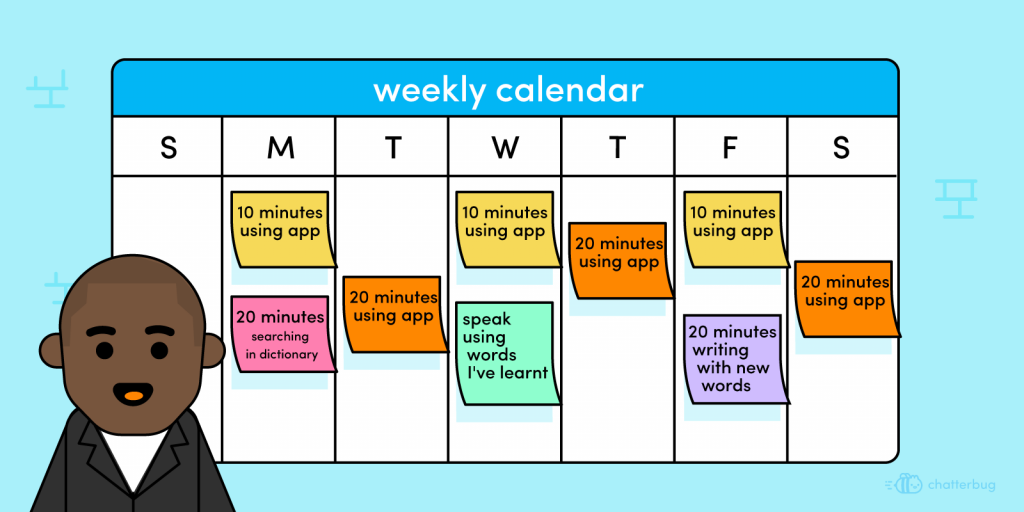
We are now getting to the present that I promised to you at the beginning, because I actually want to help you do these very things. Plan your learning and track it. I believe these are very simple steps that can incredibly help you learn a language effectively. So my present for you guys is the language planner for 2020 which my team and I have put together. It’s a beautiful, colorful, it’s an Excel sheet which you can print or you can just use it digitally. It’s up to you.
You can download it for free on the website languagementoring.com. We will send it to you by email. I hope this helps you. There is also an instruction manual. It’s very short, very simple. Once you start using it, you will see that it will be much, much, much, much simpler for you to actually learn the language when you track it, when you watch how you’re doing. That’s basically it.
Q & A
“What motivated you to learn so many language, and why these languages specifically?”
I always had a specific reason for each of the languages. I don’t learn languages just for the sake of learning languages. For example, with French, I needed that for my PhD thesis because a lot of the stuff that I needed to write about my topic was only available in French, so that was a legitimate reason. Or with Russian, for example, I really wanted to travel, do the Trans-Siberian Express, from Moscow to Mongolia. So in order to do that, for two years, I learned Russian really actively and then only used Russian on the whole journey and it was amazing.
“Please tell us more about your experiences and thoughts regarding regression and maintenance with language.”
I believe that there is a certain level where, if you get to that level, many polyglots call it the comfortable fluency level or a very good B2 level, where you use a lot of the language in speaking, you will not have to keep the language in a very active way. For example, I myself, I don’t practice my languages in a normal life. I use two years to learn a language and when I get it to that the level of comfortable fluency, I basically only read one book a year maybe. Or I talk to someone when I meet them, but this is not a routine where every day I would go through stuff. So I believe the key is to make sure you reach that level. If you don’t, then you will always, whenever you stop learning for a few weeks a month, you’ll probably get back to almost the beginner level. So I believe this has to do with a level you decide to learn a language.
“The last quick question is regarding flashcards. Somebody was wondering if it’s better to actually write your own flashcards out rather than downloading them or something like that.“
Absolutely. Absolutely. Thank you for this question because I forgot to mention, this is absolutely crucial. I always tell my students that, “Go ahead and try it with someone else’s flashcards. It will not work for you, but you need to have the experience yourself. You will not believe me before you do it. It’s absolutely important. This is about picking your own vocabulary, not just taking someone else’s vocabulary. It’s so much more efficient that, I really recommend everyone to try both ways and you will decide based on the results. I know what the results will be.
